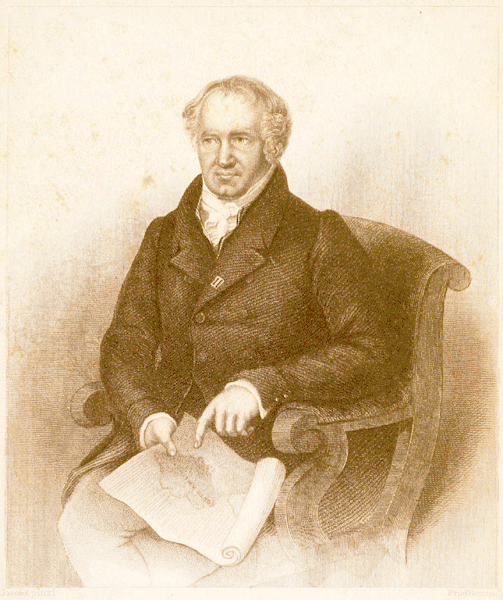The Results of the Study of Physical
Phenomena 23
023
The different Epochs of the Contemplation of the external
World. 24
024
The different Degrees of Enjoyment presented by the Contemplation of
Nature 25
025
Instances of this Species of Enjoyment 26
026
Means by which it is induced 26
The Elevations and climatic Relations of many of the most celebrated
Mountains in the World, considered with Reference to the Effect
produced on the Mind of the Observer 27-33
027
028
029
030
031
032
033
The Impressions awakened by the Aspect of tropical
Regions 34
034
035
The more accurate Knowledge of the Physical Forces of the Universe,
acquired by the Inhabitants of a small Section of the temperate Zone
36
036
The earliest Dawn of the Science of the Cosmos 36
The Difficulties that opposed the Progress of Inquiry 37
037
038
039
Consideration of the Effect produced on the Mind by the Observation of
Nature, and the Fear entertained by some of its injurious
Influence 40
040
041
042
[041] As men contemplate the riches of
nature, and see the mass of obserations incessantly increasing before
them, they become impressed with the intimate conviction that the
surface and the interior of the earth, the depths of the ocean, and the
regions of air will still, when thousands and thousands of years have
passed away, open to the scientific observer untrodden paths of
discovery.
[042] The knowledge of the laws of nature ... increases our sense of
the calm of nature. ... The superficial half-knowledge, so
characteristic of the present day, which leads to the introduction of
vaguely comprehended scientific views into general conversation, also
gives rise, under various forms, to the expression of alarm at the
supposed danger of a collision between the celestial bodies, or of
disturbance in the climatic relations of our globe. These phantoms of
the imagination are so much the more injurious as they derive their
source from dogmatic pretensions to true science. The history of the
atmosphere, and of the annual variations of its temperature, extends
already sufficiently far back to show the recurrence of slight
disturbances in the mean temperature of any given place, and thus
affords sufficient guarantee against the exaggerated apprehension of a
general and progressive deterioration of the limates of Europe.
Illustrations of the Manner in which many recent Discoveries have
tended to Remove the groundless Fears entertained regarding the Agency
of certain Natural Phenomena 43
043
044
045
046
The Amount of Scientific Knowledge required to enter on the
Consideration of Physical Phenomena 47
047
048
The Object held in View by the present Work 49
049
The Nature of the Study of the Cosmos 50
050
051
052
The special Requirements of the present Age 53
053
054
055
Limits and Method of Exposition of the Physical Description of the
Universe 56
056
057
Considerations on the terms Physiology and Physics 58
058
Physical Geography 59
059
060
061
062
Celestial Phenomena 63
063
064
The Natural Philosophy of the Ancients directed more to Celestial than
to Terrestrial Phenomena 65
065
The able Treatises of Varenius and Carl Ritter 66-67
066
067
Signification of the Word Cosmos 68-70
068 069 070
[068] The word Cosmos, which
primitively, in the Homeric ages, indicated an idea of order and
harmony, was subsequently adopted in scientific language, where it was
gradually applied to the order observed in the movements of the
heavenly bodies, to the whole universe, and then finally to the world
in which this harmony was reflected to us. The word signified ornament (as an adornment for a
man, a woman, o a horse). According to the testimony of all ancients,
it was Pythagoras who first used the word to designate the order in the
universe, and the universe itself.
The Domain embraced by Cosmography 71
071
072
073
[072] We can not survey the crust of
our planet without recognizing the traces of the prior existence and
destruction of an organic world. The sedimentary rocks present a
succession of organic forms, associated in groups, which have
successively displaced and succeeded each other. The different
superimposed strata thus display to us the faunas and floras of
different epochs.
[073] We shall never succeed in exhausting the immeasurable riches of
nature; and no generation of men will ever have cause to boast of
having comprehended the total aggregation of phenomena. ... the
fruitful doctrine of evolution shows us how, in organic development,
all that is formed is sketched out beforehand, and how the tissues of
vegetable and animal matter uniformly arise from the multiplication and
transformation of cells.
Empiricism and Experiments 74
074
075
076
[076] Science is the labor of mind
applied to nature, but the external world has no real existence for us
beyond the image reflected within ourselves through the medium of the
senses.
The Process of Reason and Induction 77
077
078
079
[077] History has preserved the record
of the
numerous attempts that have been made to form a rational conception of
the whole world of phenomena. ... It does not become the spirit which
characterizes the present age distrustfully to reject every
generalization of views and every attempt to examine into the nature of
things by the process of reason and induction. It would be a denial of
the dignity of human nature ... were we to condemn at one time austere
reason engaged in investigating causes and their mutual connections,
and at another that exercise of the imagination which prompts and
excites discoveries by its creative powers.
[358] While we maintain the unity of
the human species, we at the same time repel the depressing assumption
of superior and inferior races of men. There are nations more
susceptible of cultivation, more highly civilized, more ennobled by
mental cultivation than others, but none in themselves nobler than
others. All are in like degree designed for freedom.




